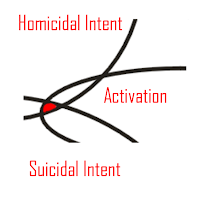At least one anti-government blogger is claiming that the government has declared Christianity crazy. Take a look at the commentary and video here. I certainly don't think Christianity itself has been declared a mental illness. It was the disturbance, the ranting and disruption, more than the content of the words Mrs. Reidy said, that caused her to be ushered off stage, and referred for a check-up.
What I find interesting is the violence in this incident. Mrs. Reidy's outburst was a mild example of expressive violence, the kind of incident that happens when stress and tension is so high a person violates a conduct boundary and acts out.
This is exactly the pattern playing out in most mass-shooter cases. People under pressure become so stressed, so anxious, so pushed by the thoughts in their head, the emotions they feel, or the pain they are experiencing, they are driven to act out -- even if this violates basic rules of normal life. Once a person crosses that threshold, almost anything can happen, depending on the nature of the person's grievance or distress, and what the person is capable of doing. If the person regards himself as willing to do violence, and there is access to weapons, things can turn bad fast.
Friends, family and neighbors might see clues about what the person is experiencing. They might be able to keep the crisis from ever happening by providing effective support, the right referral, or a healthy way of addressing the tension.
Mrs. Reidy and her family believe the outburst was the work of the Holy Spirit. They view the four weeks of sleep disturbance that preceded the incident as a period of spiritual discernment.
But what if what happened turned out to be more serious? Think about Aaron Alexis and the DC Naval Yard shootings. We can't disregard real-life trouble just because a person also has faith.
Mrs. Reidy's husband, a pastor, said that he would have tried to dissuade her.
“If she had told me, ‘I think God wants me to get up and say something,’ I’d be the first one to say, ‘No you don’t!’” he reports.

